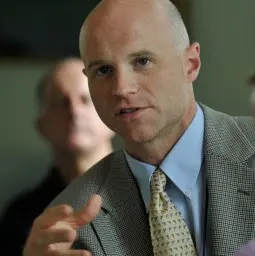While his colleagues nodded along confidently, Phil Keegan scribbled furiously in his notebook, trying to keep up with the onslaught of acronyms and regulatory terminology being bandied about.
As the sole scientist at a small medical device company and a newly minted PhD in biomedical engineering, he quickly realized how much he needed to learn in areas that went far beyond bench science to make projects succeed. There was the business side, with potential market size and health insurance reimbursement; regulatory hurdles to clear for FDA approval; intellectual property considerations; and manufacturing logistics.
“Why did no one tell me before I got here?” he remembers thinking.
 William Murphy
William Murphy
Now, seven years later, Keegan is helping prepare University of Wisconsin-Madison graduate students, including those in biomedical engineering, to navigate the intricacies of the fast-growing biotechnology industry, which includes cell and gene therapies, tissue manufacturing, biopharmaceuticals and more. Keegan, the public-private partnership lead at the Forward BIO Institute at UW-Madison, is one of the architects behind a new graduate-level course in biotechnology and innovation housed in the Department of Biomedical Engineering.
The course, which will launch in spring 2022 with Professor William Murphy as its instructor, will be built in collaboration with industry partners such as Promega, 3M, Catalent, and UW-Madison’s University Research Park, which houses numerous early stage and more established biotech companies on the city’s west side.
Keegan is not only working with those partners to craft a curriculum that’s relevant to the current state of the biotech sector, but subject-matter experts from different companies also will lead discussions on a mix of business, legal, regulatory and technical topics and consult directly with students on opportunities related to their graduate research.
The course, which is being supported through UW-Madison’s Promoting Industry Collaboration Initiative, will build toward a showcase event where students will present a value proposition around their research to industry representatives. And it will also give both sides a chance to connect about internships and job opportunities.
“We want those students to finish up their time at UW-Madison capable of making an immediate impact in the biotech industry,” says Murphy, who, in addition to being the Harvey D. Spangler Professor and H.I. Romnes Faculty Fellow, is director of the Forward BIO Institute and founder of several successful startup companies. “We want them to understand a whole lot more than a typical trainee from an academic institution would. We want them to be a step ahead.”
That same spirit drove the Forward BIO Institute to create its Innovators in Training program in 2019, giving graduate students and postdoctoral researchers across the biological sciences at UW-Madison experience with core biotech topics. The new graduate-level course is an extension of that program, with the idea that students could then participate in Innovators in Training. Keegan says he’s also hoping to build a companion course for undergraduates in fall 2022.
“It’s building this continuum of educational offerings, all to drive toward getting trainees who are interested in learning about how industry works in this biomanufacturing area more hands-on, directed training,” says Keegan, who’s working with Darilis Suarez-Gonzalez, associate chair of master’s degree programs in the Department of Biomedical Engineering, to create the course and draw students enrolled in the department’s Biomedical Innovation, Design and Entrepreneurship master’s program.
Workforce development is one piece of the Forward BIO Institute’s aim to act as a conduit between UW-Madison and the biotech industry to accelerate life science technologies that will benefit society.
“We want to be working sort of hand in glove with industry, because the reality is it accelerates the path for our technologies to impact society,” says Murphy. “It’s completely consistent with a modern interpretation of the Wisconsin Idea. We need to be working with industry for these technologies to impact society.”